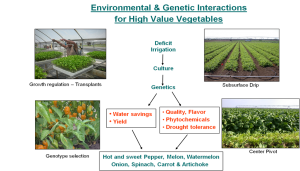Agricultural communities in southern U.S. are constantly being affected by water scarcity, increased regulations restricting water use, strong competition for irrigation water with the urban sector and frequent drought periods. On the other hand, consumer’s demand for locally-grown, high-quality and nutritious vegetables is rapidly increasing. With the rapid development of new vegetable cultivars and in conjunction with strategies leading to water conservation, improved resource use and crop cultural conditions, we expect growers in water-limited areas and semi-arid regions of Texas and the U.S. to improve their production efficiency and thus remaining competitive in the produce market.
Our stress physiology program together with the VFIC breeding team is targeting research on fresh-market and processing commodities for the ultimate benefit of producers, nurseries, packers, shippers and consumers. Traditional crops under investigation include spinach, onion, carrots, muskmelons, watermelon, and tomato. Specialty crops include sweet and hot peppers, artichokes, and other western shipper melons. Trialing different strategies occur both under controlled conditions at research Centers and on-farm. My research emphasis is on: 1) seed-transplant production and physiology to increase plant survival and enhance stand establishment under drought; 2) signaling compounds (abscisic acid – ABA, ethylene and inhibitors AVG, 1-MCP) to modulate seedling, plant and fruit growth, 3) root and shoot development under water conservation and drip irrigation systems, 4) phytochemicals and sensory attributes in response to season, deficit irrigation, nitrogen, and plant populations, and 5) genotype selection and development for drought and disease resistance, high yield, quality, and phytochemicals.

